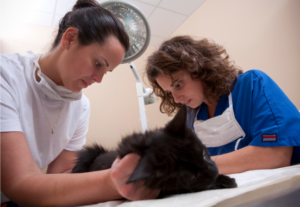Finding a veterinarian for your pet is essential to their health, but where do you start? You can ask yourself the following questions as well as taking these steps to help guide you.
What is the clinic’s cleanliness like?
Do staff members welcome pets and their owners in a friendly manner?
Do they make you feel rushed or welcomed?
Do the doctors and staff introduce themselves to you?
Do the veterinarian and staff have good skills?
Pets are an important member of the family, and it’s important for pet owners to provide their pets with the care that is up to a high standard. Finding the right veterinarian can be difficult, even for people who are much less invested in their pets than they should be.

Read More: Top 5 Reasons To Try The Acupuncture
You want to make sure that there is:
-
Experience –
When choosing a veterinarian for your pet, you’ll want to make sure the vet understands and can deal with your breed’s specific traits.
-
Chemistry –
The most important consideration when choosing a veterinarian is to find one that your pet treats well.
-
Prepare for Emergencies –
If you’re thinking about taking your family pet to the vet, always have a backup plan in case of an emergency.
-
Location –
Your pet vet should be located somewhere that you can easily get your pet to them if there is an emergency. What to expect when your pet visits the veterinarian for the first time and who is vet tech and vet assistant see this article: Schedule your appointment in advance, Call the office to book an available time slot and ask for any instructions if they are needed. Your first contact will be with a receptionist who will schedule your appointment. Be sure to bring any information on the pet’s medical history that might be necessary, in case you are asked any unexpected questions .This is a good time to ask questions about payment, fees, and emergency hours. When you arrive for your appointment, you will be greeted by one of the staff members. You’ll still have to fill out some regular documentation regarding your pet’s name, age, gender, and any medical issues they may have. When you first visit the vet, your pet will be weighed before you are led to a room where your pet’s doctor awaits. The veterinarian will then proceed to obtain any medical history from you, regarding your pet. No matter where you go, it is important that you fill out the new veterinarian’s paper work. Tell them everything you know about your pet and bring in any previous veterinary records that may be available. Meeting all of their requirements will make waiting times shorter.. Your veterinarian may begin by asking you about your pet’s daily routine, and then performing an initial examination.
- Examining your pet’s ears, eyes, and mouth
- Carefully examine your pet for any signs of irritation on their skin.
- Feel the stomach for pain, organs, or abnormalities
- Enlarged, discharged, and oddly shaped genitals
- Check the temperature of your pet
- Check the joints for pain
Read More: The dream of becoming a veterinarian or veterinarian tech?
After the initial examination, your veterinarian will likely want to run routine blood analysis and talk about spaying or neutering procedures (if not already done). They’ll also discuss your pet’s necessary vaccinations and provide them those updated vaccinations. Your doctor will likely advise you on flea and tick control as well as deworming your pet. At this time, you should be able to see the compassion and love for animals that your doctor has. Does he talk to your pet? Is the doctor and staff friendly, reassuring, and welcoming? Did the doctor take enough time with you to get a thorough understanding of both your and your pet’s needs? Were any of your concerns or questions answered in detail? After your pet’s appointment, you should be feeling good about the animal clinic you just left and there will be a business card tucked safely in your wallet with their name, address and phone numbers and a smile on your face for making the right decision. We ask that you recommend this veterinarian to your friends, family, and co-workers. Lastly, sometimes there is no cure. Your veterinarian has the same feelings as you do; he/she loves animals too.

